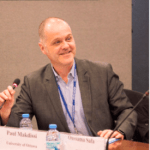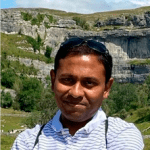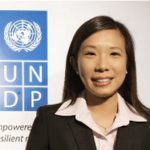Participants:
 James E. Foster is the Oliver T. Carr Professor of International Affairs and Professor of Economics at the George Washington University. He received his Ph.D. in economics from Cornell University and holds a Doctorate Honoris Causa from Universidad Autónoma del Estado de Hidalgo (Mexico). Professor Foster’s research focuses on welfare economics — using economic tools to evaluate and enhance the wellbeing of people. His joint 1984 Econometrica paper (with Joel Greer and Erik Thorbecke) is one of the most cited papers on poverty. It introduced the FGT Index, which has been used in thousands of studies and was employed in targeting the Progresa CCT program in México. Other research includes work on economic inequality with Amartya Sen; on the distribution of human development with Luis Felipe Lopez-Calva and Miguel Szekely; on multidimensional poverty with Sabina Alkire; and on literacy with Kaushik Basu. Foster regularly teaches introductory and doctoral courses on international development and each spring joins with Professor Basu in presenting an undergraduate course on Game Theory and Strategic Thinking, to which staff and Board members of the World Bank are also invited. Professor Foster is also Research Fellow at the Oxford Poverty and Human Development Initiative (OPHI), Department of International Development, Oxford University, and a member of the Human Capital and Economic Opportunity (HCEO) Working Group, Becker Friedman Institute for Research in Economics, University of Chicago. He also previously served as an Advisory Board Member on the World Bank’s Commission on Global Poverty.
James E. Foster is the Oliver T. Carr Professor of International Affairs and Professor of Economics at the George Washington University. He received his Ph.D. in economics from Cornell University and holds a Doctorate Honoris Causa from Universidad Autónoma del Estado de Hidalgo (Mexico). Professor Foster’s research focuses on welfare economics — using economic tools to evaluate and enhance the wellbeing of people. His joint 1984 Econometrica paper (with Joel Greer and Erik Thorbecke) is one of the most cited papers on poverty. It introduced the FGT Index, which has been used in thousands of studies and was employed in targeting the Progresa CCT program in México. Other research includes work on economic inequality with Amartya Sen; on the distribution of human development with Luis Felipe Lopez-Calva and Miguel Szekely; on multidimensional poverty with Sabina Alkire; and on literacy with Kaushik Basu. Foster regularly teaches introductory and doctoral courses on international development and each spring joins with Professor Basu in presenting an undergraduate course on Game Theory and Strategic Thinking, to which staff and Board members of the World Bank are also invited. Professor Foster is also Research Fellow at the Oxford Poverty and Human Development Initiative (OPHI), Department of International Development, Oxford University, and a member of the Human Capital and Economic Opportunity (HCEO) Working Group, Becker Friedman Institute for Research in Economics, University of Chicago. He also previously served as an Advisory Board Member on the World Bank’s Commission on Global Poverty.
 Sabina Alkire directs the Oxford Poverty and Human Development Initiative (OPHI), a research centre within the Oxford Department of International Development, University of Oxford. Dr Alkire works on a new approach to measuring poverty and well-being that goes beyond the traditional focus on income and growth. This multidimensional approach to measurement includes social goals, such as health, education, nutrition, standard of living and other valuable aspects of life. She devised a new method for measuring multidimensional poverty with her colleague James Foster (OPHI Research Associate and Professor of Economics at George Washington University) that has advantages over other poverty measures and has been adopted by the Mexican Government, the Bhutanese Government in their ‘Gross National Happiness Index’ and the United Nations Development Programme. Dr Alkire has been called upon to provide input and advice to several initiatives seeking to take a broader approach to well-being rather than just economic growth, for example, the Commission on the Measurement of Economic Performance and Social Progress (instigated by President Sarkozy); the United Nations Human Development Programme Human Development Report Office; the European Commission; and the UK’s Department for International Development.
Sabina Alkire directs the Oxford Poverty and Human Development Initiative (OPHI), a research centre within the Oxford Department of International Development, University of Oxford. Dr Alkire works on a new approach to measuring poverty and well-being that goes beyond the traditional focus on income and growth. This multidimensional approach to measurement includes social goals, such as health, education, nutrition, standard of living and other valuable aspects of life. She devised a new method for measuring multidimensional poverty with her colleague James Foster (OPHI Research Associate and Professor of Economics at George Washington University) that has advantages over other poverty measures and has been adopted by the Mexican Government, the Bhutanese Government in their ‘Gross National Happiness Index’ and the United Nations Development Programme. Dr Alkire has been called upon to provide input and advice to several initiatives seeking to take a broader approach to well-being rather than just economic growth, for example, the Commission on the Measurement of Economic Performance and Social Progress (instigated by President Sarkozy); the United Nations Human Development Programme Human Development Report Office; the European Commission; and the UK’s Department for International Development.
Pedro Conceição has been Director of the Human Development Report Office and lead author of the Human Development Report since 1 January 2019. Prior to this, Pedro served as Director, Strategic Policy, at the Bureau for Policy and Programme Support (from October 2014), and Chief Economist and Head of the Strategic Advisory Unit at the Regional Bureau for Africa (from 1 December 2009). Before that, he was Director of the Office of Development Studies (ODS) from March 2007 to November 2009, and Deputy Director of ODS, from October 2001 to February 2007. His work on financing for development and on global public goods was published by Oxford University Press in books he co-edited (The New Public Finance: Responding to Global Challenges, 2006; Providing Global Public Goods: Managing Globalization, 2003). He has published on inequality, the economics of innovation and technological change, and development in, amongst other journals, the African Development Review, Review of Development Economics, Eastern Economic Journal, Ecological Economics, Environmental Economics and Policy Studies, Food Policy, and Technological Forecasting and Social Change. He co-edited several books including: Innovation, Competence Building, and Social Cohesion in Europe- Towards a Learning Society (Edward Elgar, 2002) and Knowledge for Inclusive Development (Quorum Books, 2001). Prior to coming to UNDP, he was an Assistant Professor at the Instituto Superior Técnico, Technical University of Lisbon, Portugal, teaching and researching on science, technology and innovation policy. He has degrees in Physics from Instituto Superior Técnico and in Economics from the Technical University of Lisbon and a Ph. D. in Public Policy from the Lyndon B. Johnson School of Public Affairs at the University of Texas at Austin, where he studied with a Fulbright scholarship.
 Ajay Chhibber is Distinguished Visiting Scholar, Institute of International Economic Policy, Elliott School of International Affairs, George Washington University and Non-Resident Senior Fellow, the Atlantic Council, Washington DC. He is Chief Economic Advisor, Federation of Indian Chambers of Commerce and Industry (FICCI). He was earlier the first Director General ( Minister of State) , Independent Evaluation Office, Government of India and Distinguished Visiting Professor at the National Institute of Public Finance and Policy (NIPFP), India – affiliated institute of the Ministry of Finance – where he completed a major study on India’s Public Sector Enterprises. He held senior positions at the UN as Assistant Secretary General and Assistant Administrator, UNDP and managed their program for Asia and the Pacific. At the World Bank he served as Country Director in Turkey and Vietnam and Division Chief for Indonesia and the Pacific and Lead Economist, West Africa Department. He was also Director of the 1997 World Development Report on the Role of the State. He also worked in the World Bank’s Research Department, as Advisor to the Chief Economist of the World Bank and at the Public Economics Division. He has a Ph.D from Stanford University, a Masters from the Delhi School of Economics. He also has attended advanced management programs at the Harvard Business School, Harvard University and INSEAD, France. He taught at Georgetown University and at the University of Delhi. He has published widely including 5 books in development economics, and is a contributor (columnist) to several newspapers. He is now writing a book on “India: A Reset for the 21st Century” under contract with Harper-Collins.
Ajay Chhibber is Distinguished Visiting Scholar, Institute of International Economic Policy, Elliott School of International Affairs, George Washington University and Non-Resident Senior Fellow, the Atlantic Council, Washington DC. He is Chief Economic Advisor, Federation of Indian Chambers of Commerce and Industry (FICCI). He was earlier the first Director General ( Minister of State) , Independent Evaluation Office, Government of India and Distinguished Visiting Professor at the National Institute of Public Finance and Policy (NIPFP), India – affiliated institute of the Ministry of Finance – where he completed a major study on India’s Public Sector Enterprises. He held senior positions at the UN as Assistant Secretary General and Assistant Administrator, UNDP and managed their program for Asia and the Pacific. At the World Bank he served as Country Director in Turkey and Vietnam and Division Chief for Indonesia and the Pacific and Lead Economist, West Africa Department. He was also Director of the 1997 World Development Report on the Role of the State. He also worked in the World Bank’s Research Department, as Advisor to the Chief Economist of the World Bank and at the Public Economics Division. He has a Ph.D from Stanford University, a Masters from the Delhi School of Economics. He also has attended advanced management programs at the Harvard Business School, Harvard University and INSEAD, France. He taught at Georgetown University and at the University of Delhi. He has published widely including 5 books in development economics, and is a contributor (columnist) to several newspapers. He is now writing a book on “India: A Reset for the 21st Century” under contract with Harper-Collins.
 Monica Pinilla-Roncancio is a Physiotherapist with a Master’s degree in Economics from Universidad del Rosario. She has also a Master’s degree in Health Economics, Policy and Law from Erasmus University Rotterdam, Netherlands. She finished her PhD in Social Policy at the University of Birmingham, UK. From 2016 to 2018 she was as a Postdoctoral Researcher at Universidad de los Andes and currently is an Assistant Professor at the same university. She is the Co-director of Metrics and Policy at OPHI and has been working in OPHI since 2014. She coordinates the work in Latin America, East Asia and some countries in Africa and Middle East. Her main research interest are disability, multidimensional poverty, inequality and health economics.
Monica Pinilla-Roncancio is a Physiotherapist with a Master’s degree in Economics from Universidad del Rosario. She has also a Master’s degree in Health Economics, Policy and Law from Erasmus University Rotterdam, Netherlands. She finished her PhD in Social Policy at the University of Birmingham, UK. From 2016 to 2018 she was as a Postdoctoral Researcher at Universidad de los Andes and currently is an Assistant Professor at the same university. She is the Co-director of Metrics and Policy at OPHI and has been working in OPHI since 2014. She coordinates the work in Latin America, East Asia and some countries in Africa and Middle East. Her main research interest are disability, multidimensional poverty, inequality and health economics.
 Frances Stewart was Director of ODID from 1993-2003 and Director of the Centre for Research on Inequality, Human Security and Ethnicity (CRISE) at the department between 2003 and 2010. She has a DPhil from the University of Oxford and an honorary doctorate from the University of Sussex. Among many publications, she is coauthor of UNICEF’s influential study, Adjustment with a Human Face (OUP 1987); War and Underdevelopment (OUP 2001); and leading author and editor of Horizontal Inequalities and Conflict: Understanding Group Violence in Multiethnic Societies (Palgrave, 2008). She has directed a number of major research programmes including several financed by the UK Government’s Department for International Development, and others by the Swedish Development Agency and the Carnegie Corporation. An Emeritus Fellow of Somerville College, Oxford, Frances has acted as consultant for early Human Development Reports; she has been President of the Human Development and Capability Association; President of the British and Irish Development Studies Association; Chair of the United Nations Committee on Development Policy and Vice-Chair of the Board of the International Food Policy Research Institute. She received the Leontief prize in 2013 for advancing the frontiers of economic thought from Tufts University. She was given the UNDP’s Mahbub ul Haq award for her lifetime’s achievements in promoting human development in 2009; and named one of fifty outstanding technological leaders for 2003 by Scientific American (Policy Leader in Economic Development Strategies for promoting anti-poverty campaigns to help quell armed conflicts in developing countries).
Frances Stewart was Director of ODID from 1993-2003 and Director of the Centre for Research on Inequality, Human Security and Ethnicity (CRISE) at the department between 2003 and 2010. She has a DPhil from the University of Oxford and an honorary doctorate from the University of Sussex. Among many publications, she is coauthor of UNICEF’s influential study, Adjustment with a Human Face (OUP 1987); War and Underdevelopment (OUP 2001); and leading author and editor of Horizontal Inequalities and Conflict: Understanding Group Violence in Multiethnic Societies (Palgrave, 2008). She has directed a number of major research programmes including several financed by the UK Government’s Department for International Development, and others by the Swedish Development Agency and the Carnegie Corporation. An Emeritus Fellow of Somerville College, Oxford, Frances has acted as consultant for early Human Development Reports; she has been President of the Human Development and Capability Association; President of the British and Irish Development Studies Association; Chair of the United Nations Committee on Development Policy and Vice-Chair of the Board of the International Food Policy Research Institute. She received the Leontief prize in 2013 for advancing the frontiers of economic thought from Tufts University. She was given the UNDP’s Mahbub ul Haq award for her lifetime’s achievements in promoting human development in 2009; and named one of fifty outstanding technological leaders for 2003 by Scientific American (Policy Leader in Economic Development Strategies for promoting anti-poverty campaigns to help quell armed conflicts in developing countries).
 Ricardo Nogales is a Research Officer at OPHI since May 2018. He holds a BSc. and a MSc. In Economics and a PhD in Econometrics, all from the University of Geneva (Switzerland). Before joining OPHI, he was a Professor of Economics at the School of Economics and Finance of the Universidad Privada Boliviana in Bolivia and a Research Assistant at the United Nations Research Institute for Social Development (UNRISD) in Switzerland. He carried on research activities in the field of development economics, poverty reduction and human development with the IDB, UNDP, ILO, World Bank, Oxfam and IDRC. He has been an external consultant for several public organizations in Bolivia, including the Program for Strategic Research, the Central Bank, the Institute for Agricultural Insurance and the Ministry of Economics and Public Finance.
Ricardo Nogales is a Research Officer at OPHI since May 2018. He holds a BSc. and a MSc. In Economics and a PhD in Econometrics, all from the University of Geneva (Switzerland). Before joining OPHI, he was a Professor of Economics at the School of Economics and Finance of the Universidad Privada Boliviana in Bolivia and a Research Assistant at the United Nations Research Institute for Social Development (UNRISD) in Switzerland. He carried on research activities in the field of development economics, poverty reduction and human development with the IDB, UNDP, ILO, World Bank, Oxfam and IDRC. He has been an external consultant for several public organizations in Bolivia, including the Program for Strategic Research, the Central Bank, the Institute for Agricultural Insurance and the Ministry of Economics and Public Finance.
 Dean Jolliffe is a Lead Economist in the Development Data Group of the World Bank and member of the LSMS-ISA team. He has extensive experience in the design and implementation of household surveys and is currently managing ongoing LSMS-ISA work in Ethiopia. He has also worked in the South Asia region at the Bank on poverty assessments for Afghanistan, Bangladesh and Nepal. Previously, he was a Research Economist at the Economic Research Service of USDA, an Adjunct Professor at the Johns Hopkins University School of Advanced International Studies, an Assistant Professor at the Center for Economic Research and Graduate Education in Prague, and a Post-doctoral Fellow at the International Food Policy Research Institute. Dean holds appointments as a Research Fellow with the Institute for the Study of Labor in Bonn, and as a Research Affiliate with the National Poverty Center at the University of Michigan. He received his Ph.D. in economics from Princeton University.
Dean Jolliffe is a Lead Economist in the Development Data Group of the World Bank and member of the LSMS-ISA team. He has extensive experience in the design and implementation of household surveys and is currently managing ongoing LSMS-ISA work in Ethiopia. He has also worked in the South Asia region at the Bank on poverty assessments for Afghanistan, Bangladesh and Nepal. Previously, he was a Research Economist at the Economic Research Service of USDA, an Adjunct Professor at the Johns Hopkins University School of Advanced International Studies, an Assistant Professor at the Center for Economic Research and Graduate Education in Prague, and a Post-doctoral Fellow at the International Food Policy Research Institute. Dean holds appointments as a Research Fellow with the Institute for the Study of Labor in Bonn, and as a Research Affiliate with the National Poverty Center at the University of Michigan. He received his Ph.D. in economics from Princeton University.
 Vladimir Hlasny, economic affairs officer with UN-ESCWA (Beirut), Poverty and inequality research team. Previously an associate professor of Economics at Ewha Womans University (Seoul). His work is on labor market conditions and the distribution of economic outcomes in Asia and the Middle East. His research has been published in general-interest journals including the World Bank Economic Review, Review of Income and Wealth, Journal of Regulatory Economics, Development and Change, and Social Science Quarterly. PhD in Economics from Michigan State University.
Vladimir Hlasny, economic affairs officer with UN-ESCWA (Beirut), Poverty and inequality research team. Previously an associate professor of Economics at Ewha Womans University (Seoul). His work is on labor market conditions and the distribution of economic outcomes in Asia and the Middle East. His research has been published in general-interest journals including the World Bank Economic Review, Review of Income and Wealth, Journal of Regulatory Economics, Development and Change, and Social Science Quarterly. PhD in Economics from Michigan State University. Hassan Hamie, economist with UN-ESCWA (Beirut), Poverty and inequality research team. Previously worked as an engineer for the Lebanese Petroleum Administration. Currently working on the topics of poverty, Inequality and inclusive development. PhD in Energy Economics from Technical University of Vienna.
Hassan Hamie, economist with UN-ESCWA (Beirut), Poverty and inequality research team. Previously worked as an engineer for the Lebanese Petroleum Administration. Currently working on the topics of poverty, Inequality and inclusive development. PhD in Energy Economics from Technical University of Vienna. Paul Makdissi is a professor at the Department of Economics of the University of Ottawa. He is currently an Associate Editor of the Journal of Economic Inequality. Previously he has held positions at the Université de Sherbrooke (Canada) and the Vrije Universiteit Amsterdam (The Netherlands). His main areas of research are socioeconomic health inequality measurement, the distributive impact of taxation and public pricing, and income inequality measurement. He was the president of the Société canadienne de science économique (the French Canadian economics association) for the 2021-2022 academic year. From 2017 to 2019, he was the thematic leader for the Equity and Inclusive Growth research theme for the Economic Research Forum for the Arab Countries, Iran and Turkey. He has also been a consultant for many federal and provincial ministries and agencies in Canada, the World Bank, and the United Nations Economic and Social Commission for Western Asia.
Paul Makdissi is a professor at the Department of Economics of the University of Ottawa. He is currently an Associate Editor of the Journal of Economic Inequality. Previously he has held positions at the Université de Sherbrooke (Canada) and the Vrije Universiteit Amsterdam (The Netherlands). His main areas of research are socioeconomic health inequality measurement, the distributive impact of taxation and public pricing, and income inequality measurement. He was the president of the Société canadienne de science économique (the French Canadian economics association) for the 2021-2022 academic year. From 2017 to 2019, he was the thematic leader for the Equity and Inclusive Growth research theme for the Economic Research Forum for the Arab Countries, Iran and Turkey. He has also been a consultant for many federal and provincial ministries and agencies in Canada, the World Bank, and the United Nations Economic and Social Commission for Western Asia. Suman Seth is an Associate Professor of Economics at the Leeds University Business School and an honorary Research Associate at the Oxford Poverty and Human Development Initiative (OPHI). He had previously been a Research Officer and a Senior Research Officer at OPHI between 2010 and 2015. He is primarily interested in Development Economics with a particular emphasis on measurement methodologies and policy-oriented applications. Previously, he has served as consultants to the Regional Bureau of Latin America and the Caribbean, United Nations Development Programme (UNDP), to the Development Research Groups at the World Bank, and to the Asian Development Bank. He has co-authored a book on income poverty measurement with the World Bank and a book on multidimensional poverty with OPHI colleagues.
Suman Seth is an Associate Professor of Economics at the Leeds University Business School and an honorary Research Associate at the Oxford Poverty and Human Development Initiative (OPHI). He had previously been a Research Officer and a Senior Research Officer at OPHI between 2010 and 2015. He is primarily interested in Development Economics with a particular emphasis on measurement methodologies and policy-oriented applications. Previously, he has served as consultants to the Regional Bureau of Latin America and the Caribbean, United Nations Development Programme (UNDP), to the Development Research Groups at the World Bank, and to the Asian Development Bank. He has co-authored a book on income poverty measurement with the World Bank and a book on multidimensional poverty with OPHI colleagues. Ricardo Nogales (Universidad Privada de Bolivia and Oxford Poverty and Human Development Initiative, University of Oxford)
Ricardo Nogales (Universidad Privada de Bolivia and Oxford Poverty and Human Development Initiative, University of Oxford) Nicolai Suppa (Centre for Demographic Studies, Universidad Autónoma de Barcelona and Oxford Poverty and Human Development Initiative, University of Oxford)
Nicolai Suppa (Centre for Demographic Studies, Universidad Autónoma de Barcelona and Oxford Poverty and Human Development Initiative, University of Oxford) Yu-Chieh Hsu (Human Development Report Office)
Yu-Chieh Hsu (Human Development Report Office) Tasneem Mirza (United Nations Development Programme)
Tasneem Mirza (United Nations Development Programme) James E. Foster is the Oliver T. Carr Professor of International Affairs and Professor of Economics at the George Washington University. He received his Ph.D. in economics from Cornell University and holds a Doctorate Honoris Causa from Universidad Autónoma del Estado de Hidalgo (Mexico). Professor Foster’s research focuses on welfare economics — using economic tools to evaluate and enhance the wellbeing of people. His joint 1984 Econometrica paper (with Joel Greer and Erik Thorbecke) is one of the most cited papers on poverty. It introduced the FGT Index, which has been used in thousands of studies and was employed in targeting the Progresa CCT program in México. Other research includes work on economic inequality with Amartya Sen; on the distribution of human development with Luis Felipe Lopez-Calva and Miguel Szekely; on multidimensional poverty with Sabina Alkire; and on literacy with Kaushik Basu. Foster regularly teaches introductory and doctoral courses on international development and each spring joins with Professor Basu in presenting an undergraduate course on Game Theory and Strategic Thinking, to which staff and Board members of the World Bank are also invited. Professor Foster is also Research Fellow at the Oxford Poverty and Human Development Initiative (OPHI), Department of International Development, Oxford University, and a member of the Human Capital and Economic Opportunity (HCEO) Working Group, Becker Friedman Institute for Research in Economics, University of Chicago. He also previously served as an Advisory Board Member on the World Bank’s Commission on Global Poverty.
James E. Foster is the Oliver T. Carr Professor of International Affairs and Professor of Economics at the George Washington University. He received his Ph.D. in economics from Cornell University and holds a Doctorate Honoris Causa from Universidad Autónoma del Estado de Hidalgo (Mexico). Professor Foster’s research focuses on welfare economics — using economic tools to evaluate and enhance the wellbeing of people. His joint 1984 Econometrica paper (with Joel Greer and Erik Thorbecke) is one of the most cited papers on poverty. It introduced the FGT Index, which has been used in thousands of studies and was employed in targeting the Progresa CCT program in México. Other research includes work on economic inequality with Amartya Sen; on the distribution of human development with Luis Felipe Lopez-Calva and Miguel Szekely; on multidimensional poverty with Sabina Alkire; and on literacy with Kaushik Basu. Foster regularly teaches introductory and doctoral courses on international development and each spring joins with Professor Basu in presenting an undergraduate course on Game Theory and Strategic Thinking, to which staff and Board members of the World Bank are also invited. Professor Foster is also Research Fellow at the Oxford Poverty and Human Development Initiative (OPHI), Department of International Development, Oxford University, and a member of the Human Capital and Economic Opportunity (HCEO) Working Group, Becker Friedman Institute for Research in Economics, University of Chicago. He also previously served as an Advisory Board Member on the World Bank’s Commission on Global Poverty. Sabina Alkire directs the Oxford Poverty and Human Development Initiative (OPHI), a research centre within the Oxford Department of International Development, University of Oxford. Dr Alkire works on a new approach to measuring poverty and well-being that goes beyond the traditional focus on income and growth. This multidimensional approach to measurement includes social goals, such as health, education, nutrition, standard of living and other valuable aspects of life. She devised a new method for measuring multidimensional poverty with her colleague James Foster (OPHI Research Associate and Professor of Economics at George Washington University) that has advantages over other poverty measures and has been adopted by the Mexican Government, the Bhutanese Government in their ‘Gross National Happiness Index’ and the United Nations Development Programme. Dr Alkire has been called upon to provide input and advice to several initiatives seeking to take a broader approach to well-being rather than just economic growth, for example, the Commission on the Measurement of Economic Performance and Social Progress (instigated by President Sarkozy); the United Nations Human Development Programme Human Development Report Office; the European Commission; and the UK’s Department for International Development.
Sabina Alkire directs the Oxford Poverty and Human Development Initiative (OPHI), a research centre within the Oxford Department of International Development, University of Oxford. Dr Alkire works on a new approach to measuring poverty and well-being that goes beyond the traditional focus on income and growth. This multidimensional approach to measurement includes social goals, such as health, education, nutrition, standard of living and other valuable aspects of life. She devised a new method for measuring multidimensional poverty with her colleague James Foster (OPHI Research Associate and Professor of Economics at George Washington University) that has advantages over other poverty measures and has been adopted by the Mexican Government, the Bhutanese Government in their ‘Gross National Happiness Index’ and the United Nations Development Programme. Dr Alkire has been called upon to provide input and advice to several initiatives seeking to take a broader approach to well-being rather than just economic growth, for example, the Commission on the Measurement of Economic Performance and Social Progress (instigated by President Sarkozy); the United Nations Human Development Programme Human Development Report Office; the European Commission; and the UK’s Department for International Development. Ajay Chhibber is Distinguished Visiting Scholar, Institute of International Economic Policy, Elliott School of International Affairs, George Washington University and Non-Resident Senior Fellow, the Atlantic Council, Washington DC. He is Chief Economic Advisor, Federation of Indian Chambers of Commerce and Industry (FICCI). He was earlier the first Director General ( Minister of State) , Independent Evaluation Office, Government of India and Distinguished Visiting Professor at the National Institute of Public Finance and Policy (NIPFP), India – affiliated institute of the Ministry of Finance – where he completed a major study on India’s Public Sector Enterprises. He held senior positions at the UN as Assistant Secretary General and Assistant Administrator, UNDP and managed their program for Asia and the Pacific. At the World Bank he served as Country Director in Turkey and Vietnam and Division Chief for Indonesia and the Pacific and Lead Economist, West Africa Department. He was also Director of the 1997 World Development Report on the Role of the State. He also worked in the World Bank’s Research Department, as Advisor to the Chief Economist of the World Bank and at the Public Economics Division. He has a Ph.D from Stanford University, a Masters from the Delhi School of Economics. He also has attended advanced management programs at the Harvard Business School, Harvard University and INSEAD, France. He taught at Georgetown University and at the University of Delhi. He has published widely including 5 books in development economics, and is a contributor (columnist) to several newspapers. He is now writing a book on “India: A Reset for the 21st Century” under contract with Harper-Collins.
Ajay Chhibber is Distinguished Visiting Scholar, Institute of International Economic Policy, Elliott School of International Affairs, George Washington University and Non-Resident Senior Fellow, the Atlantic Council, Washington DC. He is Chief Economic Advisor, Federation of Indian Chambers of Commerce and Industry (FICCI). He was earlier the first Director General ( Minister of State) , Independent Evaluation Office, Government of India and Distinguished Visiting Professor at the National Institute of Public Finance and Policy (NIPFP), India – affiliated institute of the Ministry of Finance – where he completed a major study on India’s Public Sector Enterprises. He held senior positions at the UN as Assistant Secretary General and Assistant Administrator, UNDP and managed their program for Asia and the Pacific. At the World Bank he served as Country Director in Turkey and Vietnam and Division Chief for Indonesia and the Pacific and Lead Economist, West Africa Department. He was also Director of the 1997 World Development Report on the Role of the State. He also worked in the World Bank’s Research Department, as Advisor to the Chief Economist of the World Bank and at the Public Economics Division. He has a Ph.D from Stanford University, a Masters from the Delhi School of Economics. He also has attended advanced management programs at the Harvard Business School, Harvard University and INSEAD, France. He taught at Georgetown University and at the University of Delhi. He has published widely including 5 books in development economics, and is a contributor (columnist) to several newspapers. He is now writing a book on “India: A Reset for the 21st Century” under contract with Harper-Collins. Monica Pinilla-Roncancio is a Physiotherapist with a Master’s degree in Economics from Universidad del Rosario. She has also a Master’s degree in Health Economics, Policy and Law from Erasmus University Rotterdam, Netherlands. She finished her PhD in Social Policy at the University of Birmingham, UK. From 2016 to 2018 she was as a Postdoctoral Researcher at Universidad de los Andes and currently is an Assistant Professor at the same university. She is the Co-director of Metrics and Policy at OPHI and has been working in OPHI since 2014. She coordinates the work in Latin America, East Asia and some countries in Africa and Middle East. Her main research interest are disability, multidimensional poverty, inequality and health economics.
Monica Pinilla-Roncancio is a Physiotherapist with a Master’s degree in Economics from Universidad del Rosario. She has also a Master’s degree in Health Economics, Policy and Law from Erasmus University Rotterdam, Netherlands. She finished her PhD in Social Policy at the University of Birmingham, UK. From 2016 to 2018 she was as a Postdoctoral Researcher at Universidad de los Andes and currently is an Assistant Professor at the same university. She is the Co-director of Metrics and Policy at OPHI and has been working in OPHI since 2014. She coordinates the work in Latin America, East Asia and some countries in Africa and Middle East. Her main research interest are disability, multidimensional poverty, inequality and health economics. Frances Stewart was Director of ODID from 1993-2003 and Director of the Centre for Research on Inequality, Human Security and Ethnicity (CRISE) at the department between 2003 and 2010. She has a DPhil from the University of Oxford and an honorary doctorate from the University of Sussex. Among many publications, she is coauthor of UNICEF’s influential study, Adjustment with a Human Face (OUP 1987); War and Underdevelopment (OUP 2001); and leading author and editor of Horizontal Inequalities and Conflict: Understanding Group Violence in Multiethnic Societies (Palgrave, 2008). She has directed a number of major research programmes including several financed by the UK Government’s Department for International Development, and others by the Swedish Development Agency and the Carnegie Corporation. An Emeritus Fellow of Somerville College, Oxford, Frances has acted as consultant for early Human Development Reports; she has been President of the Human Development and Capability Association; President of the British and Irish Development Studies Association; Chair of the United Nations Committee on Development Policy and Vice-Chair of the Board of the International Food Policy Research Institute. She received the Leontief prize in 2013 for advancing the frontiers of economic thought from Tufts University. She was given the UNDP’s Mahbub ul Haq award for her lifetime’s achievements in promoting human development in 2009; and named one of fifty outstanding technological leaders for 2003 by Scientific American (Policy Leader in Economic Development Strategies for promoting anti-poverty campaigns to help quell armed conflicts in developing countries).
Frances Stewart was Director of ODID from 1993-2003 and Director of the Centre for Research on Inequality, Human Security and Ethnicity (CRISE) at the department between 2003 and 2010. She has a DPhil from the University of Oxford and an honorary doctorate from the University of Sussex. Among many publications, she is coauthor of UNICEF’s influential study, Adjustment with a Human Face (OUP 1987); War and Underdevelopment (OUP 2001); and leading author and editor of Horizontal Inequalities and Conflict: Understanding Group Violence in Multiethnic Societies (Palgrave, 2008). She has directed a number of major research programmes including several financed by the UK Government’s Department for International Development, and others by the Swedish Development Agency and the Carnegie Corporation. An Emeritus Fellow of Somerville College, Oxford, Frances has acted as consultant for early Human Development Reports; she has been President of the Human Development and Capability Association; President of the British and Irish Development Studies Association; Chair of the United Nations Committee on Development Policy and Vice-Chair of the Board of the International Food Policy Research Institute. She received the Leontief prize in 2013 for advancing the frontiers of economic thought from Tufts University. She was given the UNDP’s Mahbub ul Haq award for her lifetime’s achievements in promoting human development in 2009; and named one of fifty outstanding technological leaders for 2003 by Scientific American (Policy Leader in Economic Development Strategies for promoting anti-poverty campaigns to help quell armed conflicts in developing countries). Ricardo Nogales is a Research Officer at OPHI since May 2018. He holds a BSc. and a MSc. In Economics and a PhD in Econometrics, all from the University of Geneva (Switzerland). Before joining OPHI, he was a Professor of Economics at the School of Economics and Finance of the Universidad Privada Boliviana in Bolivia and a Research Assistant at the United Nations Research Institute for Social Development (UNRISD) in Switzerland. He carried on research activities in the field of development economics, poverty reduction and human development with the IDB, UNDP, ILO, World Bank, Oxfam and IDRC. He has been an external consultant for several public organizations in Bolivia, including the Program for Strategic Research, the Central Bank, the Institute for Agricultural Insurance and the Ministry of Economics and Public Finance.
Ricardo Nogales is a Research Officer at OPHI since May 2018. He holds a BSc. and a MSc. In Economics and a PhD in Econometrics, all from the University of Geneva (Switzerland). Before joining OPHI, he was a Professor of Economics at the School of Economics and Finance of the Universidad Privada Boliviana in Bolivia and a Research Assistant at the United Nations Research Institute for Social Development (UNRISD) in Switzerland. He carried on research activities in the field of development economics, poverty reduction and human development with the IDB, UNDP, ILO, World Bank, Oxfam and IDRC. He has been an external consultant for several public organizations in Bolivia, including the Program for Strategic Research, the Central Bank, the Institute for Agricultural Insurance and the Ministry of Economics and Public Finance. Dean Jolliffe is a Lead Economist in the Development Data Group of the World Bank and member of the LSMS-ISA team. He has extensive experience in the design and implementation of household surveys and is currently managing ongoing LSMS-ISA work in Ethiopia. He has also worked in the South Asia region at the Bank on poverty assessments for Afghanistan, Bangladesh and Nepal. Previously, he was a Research Economist at the Economic Research Service of USDA, an Adjunct Professor at the Johns Hopkins University School of Advanced International Studies, an Assistant Professor at the Center for Economic Research and Graduate Education in Prague, and a Post-doctoral Fellow at the International Food Policy Research Institute. Dean holds appointments as a Research Fellow with the Institute for the Study of Labor in Bonn, and as a Research Affiliate with the National Poverty Center at the University of Michigan. He received his Ph.D. in economics from Princeton University.
Dean Jolliffe is a Lead Economist in the Development Data Group of the World Bank and member of the LSMS-ISA team. He has extensive experience in the design and implementation of household surveys and is currently managing ongoing LSMS-ISA work in Ethiopia. He has also worked in the South Asia region at the Bank on poverty assessments for Afghanistan, Bangladesh and Nepal. Previously, he was a Research Economist at the Economic Research Service of USDA, an Adjunct Professor at the Johns Hopkins University School of Advanced International Studies, an Assistant Professor at the Center for Economic Research and Graduate Education in Prague, and a Post-doctoral Fellow at the International Food Policy Research Institute. Dean holds appointments as a Research Fellow with the Institute for the Study of Labor in Bonn, and as a Research Affiliate with the National Poverty Center at the University of Michigan. He received his Ph.D. in economics from Princeton University.